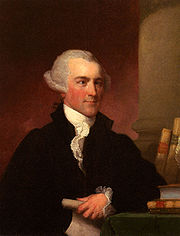Josiah Quincy II
Josiah Quincy II or Josiah Quincy Jr [ ˈkwɪnzi ] (born February 23, 1744 in Boston , † April 26, 1775 at sea) was an American lawyer and advocate of independence.
Life
He was the son of Josiah Quincy I (1709–1784). After studying at Harvard University , which he graduated in 1763, he was successful as a lawyer in his hometown.
He wrote two articles under the pseudonym Hyperion in 1767 for the local newspaper, the Boston Gazette , in which he sharply polemicized against British tax and other colonial regulations. Another article followed in September 1768, the last of his articles published under Hyperion followed in February 1770, in which he called on his fellow citizens to “abandon social dealings with those who pollute trade, poison their luxury goods, their greed for money not to be satisfied and whose oppression should not be endured ”. He made a decisive contribution to the mood that ultimately led to the so-called Boston Tea Party and thus ushered in American independence . Together with John Adams , he took over the defense of Captain Thomas Preston and the soldiers involved in the Boston massacre after the American uprising and ensured their acquittal.
In 1774 he published one of his most important writings, the Observations on the Act of Parliament , which is commonly referred to as the " Boston Port Bill " and contains seminal philosophical and legal foundations for American politics.
On March 16, 1775, he was sent to England for negotiations . On the way home he died shortly before returning even on a boat in sight of the coast of Massachusetts to tuberculosis .
His son Josiah Quincy III (1772-1864), the mayor of Boston, member of the House of Representatives , and President of Harvard University , wrote his biography ( Memoir of Josiah Quincy Jr. Boston 1825).
literature
- Quincy, Josiah . In: Encyclopædia Britannica . 11th edition. tape 22 : Poll - Reeves . London 1911, p. 753 (English, full text [ Wikisource ]).
Individual evidence
- ↑ In later writings that he sent to the Boston Gazette, he used the pseudonyms Mentor, Callisthenes, Marchmont Needham, Edward Sexby.
- ^ Boston Gazette , February 12, 1770: "to break off all social intercourse with those whose commerce contaminates, whose luxuries poison, whose avarice is insatiable, and whose unnatural oppressions are not to be borne."
- ↑ Holly Brewer: By Birth Or Consent . Omohundro Institute of Early American History & Culture, UNC Press, 2005, ISBN 0-8078-2950-1 , p. 114 ff.
| personal data | |
|---|---|
| SURNAME | Quincy, Josiah |
| ALTERNATIVE NAMES | Hyperion |
| BRIEF DESCRIPTION | American lawyer |
| DATE OF BIRTH | February 23, 1744 |
| PLACE OF BIRTH | Boston |
| DATE OF DEATH | April 26, 1775 |
| Place of death | at sea in the Atlantic Ocean |
